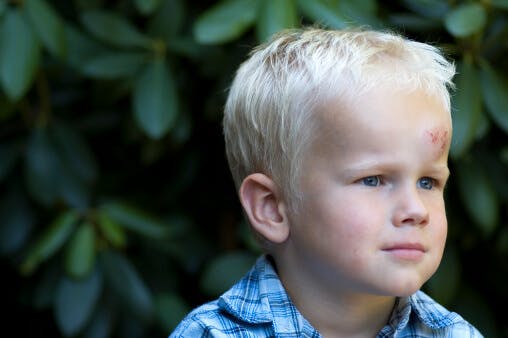When to Call the Doctor after your Child Hits Their Head

When we hear the awful thud of a child’s head, our breath catches. A prompt cry after the injury is reassuring but can be scary too. Kids may cry very intensely and even find it hard to catch their breath after a hard bump. In fact, a hard head bump is a common cause of a breath-holding spell in younger kids. Your first job after a head bump is to check the area for any bleeding or open wounds. Then, comfort your child by hugging them, picking them up and speaking calmly to them. It may take as long as 10-15 minutes for them to calm down. As they are calming down, check for the symptoms listed below.
If you observe any of the following after your child hits their head, medical attention.
If your child hits their head and is (or has):
- Under six months of age
- Unconscious, even briefly
- Crying for longer than 10 minutes or prolonged irritability
- Vomiting repeatedly
- Bleeding or other liquid draining from the ears, mouth, or nose
- Rapid swelling just above the ear
- Bruising around the ear or eye
- Unable to walk or talk normally
- Acting strangely or drowsy
- Unequal pupil size
- Severe, worsening headache
- Neck pain or stiffness
- Seizures
- Skull indentation or large bump
- Great force of injury (car accident, long fall, baseball bat, etc.)
- Worsening symptoms or symptoms improve then worsen
What next?
If any of these symptoms or situations are present or if you have any concerns, call your physician right away. Your child may be fine, but you should be in touch with an expert. If your child is unable to get up by herself or is unconscious immediately after the head injury, don’t move her. Call 911 and wait for emergency help to arrive.
What else?
Episodes of pediatric head trauma, or bumps to the head, are very common and result in > 500,000 emergency room visits a year. It is helpful to keep in mind some key points about when to go to the emergency room after a head bump.
If none of these symptoms listed above are present, it is fine to keep your child at home and let them sleep or rest, as long as you are nearby to consistently check on her. Sleepiness or drowsiness can be common immediately after a head injury. Many physicians recommend waking your child to see if they are oriented after the initial two hours of sleeping. After this, awaken her at your bedtime and again four hours later to check on her status. After 24 hours it is fine to return to a normal sleep routine.
Other common symptoms include headache and mild tummy upset. .. Watch your child closely for the first two hours after the injury and avoid pain medications for these first couple of hours. In general we also recommend avoiding heavy foods that may cause vomiting during this time. If at any time your child seems to develop a suspicious symptom, call your doctor immediately.
It is common for head bumps to develop large “goose eggs” or swellings; this is because of the large blood supply to the scalp. The large swelling does not indicate brain swelling. This area of swelling may be uncomfortable when touched, but as long as your child is otherwise acting normally, it is generally not a cause for concern. Using ice packs on the area may help reduce the initial swelling. During subsequent days, the swelling may drain down the face causing swelling and even bruising underneath where the original injury was. If you ever become concerned about new symptoms or increasing pain, please call your pediatrician for an evaluation.
After typical childhood head bumps the child is often back up and playing normally within a couple hours or a day. If symptoms are lasting longer, getting worse or you are just otherwise concerned about your child contact your pediatrician.
A quick note on concussion
A concussion is an injury to the brain usually caused by a jolt or bump to the head which causes the brain to move back and forth. For more detailed information on signs of concussion please go to our article on concussion here.

Did the information in this article help to answer your questions? What else could we include here to help other parents who are wondering if they should call a doctor after their child has hit their head?
References and Resources
Gelineau-Morel, Rose, et al. Pediatric Head Trauma: A Review and Update. Pediatrics in Review September 2019, 40 (9) 468-481.
Lumba-Brown A, et al. Centers for Disease Control and Prevention Guideline on the Diagnosis and Management of Mild Traumatic Brain Injury Among Children. JAMA Pediatr. 2018 Nov 1;172(11):e182853.


